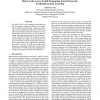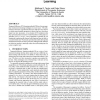147 search results - page 11 / 30 » Rule value reinforcement learning for cognitive agents |
IWANN
1999
Springer
13 years 12 months ago
1999
Springer
To avoid the curse of dimensionality, function approximators are used in reinforcement learning to learn value functions for individual states. In order to make better use of comp...
IJCAI
2007
13 years 9 months ago
2007
TD-FALCON is a self-organizing neural network that incorporates Temporal Difference (TD) methods for reinforcement learning. Despite the advantages of fast and stable learning, TD...
ATAL
2005
Springer
14 years 1 months ago
2005
Springer
Temporal difference (TD) learning methods [22] have become popular reinforcement learning techniques in recent years. TD methods have had some experimental successes and have been...
ICML
2003
IEEE
14 years 27 days ago
2003
IEEE
Reinforcement learning has been used for training game playing agents. The value function for a complex game must be approximated with a continuous function because the number of ...
ATAL
2004
Springer
14 years 1 months ago
2004
Springer
Research on coalition formation usually assumes the values of potential coalitions to be known with certainty. Furthermore, settings in which agents lack sufficient knowledge of ...


